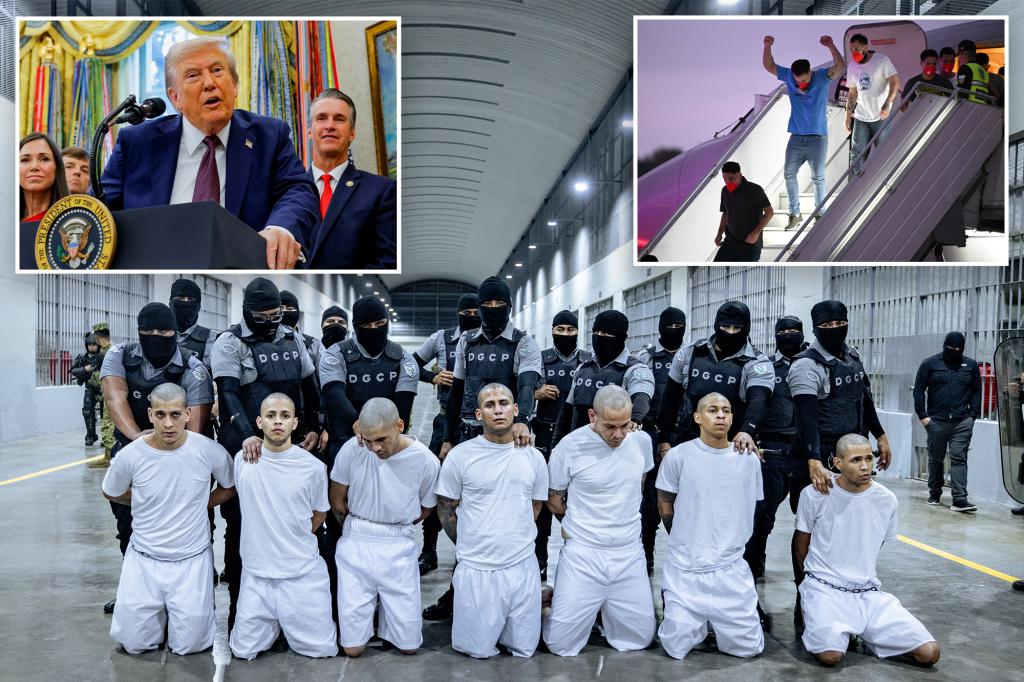Appeals Court Blocks Trump’s Attempt to Speed Deportations of Venezuelan Gang Members
Federal Court Ruling on Alien Enemies Act of 1798
In a significant legal decision, a federal appeals court has rejected the Trump administration’s attempt to expedite deportations of migrants allegedly affiliated with the Venezuelan gang Tren de Aragua. The Fifth US Circuit Court of Appeals ruled 2-1 that the administration cannot invoke the Alien Enemies Act of 1798 – a rarely used wartime law – to deport these individuals. Judges Leslie Southwick and Irma Carrillo Ramirez, who formed the majority opinion, determined that the current situation involving Venezuelan migrants does not constitute the type of national conflict Congress envisioned when passing the law more than two centuries ago. “A country encouraging its residents and citizens to enter this country illegally is not the modern-day equivalent of sending an armed, organized force to occupy, to disrupt, or to otherwise harm the United States,” they wrote in their decision. This ruling effectively blocks deportations from Texas, Louisiana, and Mississippi, representing a significant setback to the administration’s immigration enforcement strategy.
Historical Context and Current Application
The Alien Enemies Act has only been invoked three times throughout American history – during declared wars in the War of 1812 and both World Wars. Its application in the current context represents an unprecedented expansion of executive power in peacetime immigration enforcement. The Trump administration had argued that courts should not question the president’s determination that Tren de Aragua poses a national security threat due to alleged connections with Venezuela’s government. Under this claim, the administration deported suspected gang members to a prison facility in El Salvador, arguing that U.S. courts could not order their release from this location. More than 250 of these deported migrants eventually returned to Venezuela under an agreement announced in July. The ACLU’s Lee Gelernt, who argued against the administration’s position, celebrated the ruling as “a critically important decision reining in the administration’s view that it can simply declare an emergency without any oversight by the courts.”
Legal Arguments and the Dissenting Opinion
The core legal question centered on whether the executive branch could unilaterally determine that gang activity constituted a threat equivalent to wartime hostilities. The majority opinion found that the plaintiffs deserved a preliminary injunction because they “found no invasion or predatory incursion” that would justify the extraordinary use of this wartime power. However, the decision was not unanimous. In a strongly worded dissent, Judge Andrew Oldham argued that the majority had overstepped by second-guessing presidential authority in matters of foreign affairs and national security – areas where courts have traditionally granted extensive deference to executive judgment. “The majority’s approach to this case is not only unprecedented—it is contrary to more than 200 years of precedent,” Oldham wrote, reflecting the deep constitutional divisions at play in this case. Despite this disagreement, the court did hand the administration one victory by upholding the procedures used to advise detainees of their legal rights under the Act.
Broader Implications for Immigration Policy
This ruling arrives amid heightened tensions over immigration policy in the United States, particularly regarding migrants crossing the southern border. The Trump administration’s attempt to use the Alien Enemies Act represents one of several aggressive approaches to immigration enforcement, targeting specific groups deemed threats to national security. By connecting the Venezuelan gang Tren de Aragua to Venezuela’s government, the administration sought to frame an immigration issue as a matter of national defense, potentially creating a precedent for expanded executive authority in deportation cases. The court’s rejection of this approach reinforces judicial oversight of immigration enforcement and establishes limits on executive power in determining who constitutes an “enemy” during peacetime. The decision also impacts the more than 250 migrants who were deported and later returned to Venezuela, highlighting the human consequences of these legal battles.
International Dimensions and Diplomatic Considerations
The case touches on complex international relations between the United States and Venezuela, as well as broader regional migration patterns. By claiming that Tren de Aragua operates with Venezuelan government support, the administration introduced geopolitical dimensions to what might otherwise be treated as a criminal justice or immigration matter. The deportation of alleged gang members to El Salvador rather than directly to Venezuela further complicated the situation, creating a triangular diplomatic scenario involving three nations. This approach raised questions about jurisdiction, international law, and the rights of migrants in transit between multiple countries. The court’s ruling implicitly addresses these international considerations by determining that the current migration situation, even with alleged criminal elements, does not constitute a form of state-sponsored aggression that would justify invoking wartime powers.
The Path Forward and Future Legal Battles
This ruling is unlikely to be the final word on the matter. The administration can appeal the decision either to the full Fifth Circuit or directly to the Supreme Court, which observers expect will ultimately decide the case’s outcome. The constitutional questions at stake – regarding executive power, national security determinations, and judicial review – make this a potentially landmark case in immigration law. Whatever the final resolution, the case highlights the ongoing tension between aggressive immigration enforcement policies and constitutional protections that extend to non-citizens within U.S. borders. It also underscores how centuries-old laws can be reinterpreted and redeployed in contemporary contexts, requiring courts to determine whether such applications remain consistent with the original legislative intent and constitutional principles. As migration pressures continue and security concerns persist, similar legal battles will likely shape the boundaries of executive authority in immigration enforcement for years to come.


